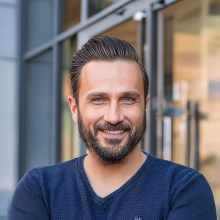NEW
Proxify is bringing transparency to tech team performance based on research conducted at Stanford. An industry first, built for engineering leaders.
Learn more
C is a foundational language that powers many critical systems and applications. Its low-level capabilities and close-to-the-metal nature make it indispensable in environments where performance and resource management are paramount.
This guide aims to provide insights into the key skills, qualifications, and interview questions necessary to identify top-notch C developers for your team.
About C
C is a general-purpose programming language that has been the bedrock of modern computing since Dennis Ritchie at Bell Labs developed it in the early 1970s. Known for its efficiency, flexibility, and performance, C is extensively used in system programming, embedded systems, and applications requiring direct hardware manipulation.
C's simplicity and power lie in its close relationship with machine instructions, making it ideal for developing operating systems, compilers, and embedded software. The language provides low-level memory access and requires a disciplined approach to manage resources effectively, a trait that has led to its enduring popularity in critical software development.
Unlike higher-level languages, C offers limited abstraction from hardware, giving developers fine-grained control over system resources. This control is essential for applications where performance and memory efficiency are crucial. The language's versatility makes it a stepping stone for learning other programming languages.
Hiring skilled C Developers ensures that your projects benefit from their ability to write optimized, reliable code that can operate efficiently within constrained environments. Their expertise is critical in operating system development, real-time systems, and embedded programming, where C remains unparalleled.
Essential skills for C Developers
C developers are typically hired across various domains, so narrowing down essential technical skills an experienced developer should have is challenging. You should also note that suggestions in our hiring guide may vary depending on a C developer's role.
Proficiency in C and standard libraries
A solid understanding of C syntax and standard libraries is crucial. This includes familiarity with standard functions provided by libraries like <stdio.h>, <stdlib.h>, and <string.h>. Proficiency in these areas is foundational for any C Developer.
Expertise in memory management
Mastery of memory management is critical in C, where manual memory allocation and deallocation are required. Developers should be skilled in using pointers, understanding memory allocation functions (malloc, calloc, realloc, free), and avoiding common pitfalls like memory leaks and buffer overflows.
Understanding of computer architecture and modern C standards
A deep understanding of computer architecture, including how C interacts with hardware, is essential. Knowledge of modern C standards and their features is also crucial to ensure writing up-to-date and efficient code.
Build tools and environments
Proficiency with build tools like Makefile and compilers (such as GCC and Clang) is essential. Developers should also be familiar with cross-platform development and optimizing build environments for different targets.
Nice-to-have skills for C Developers
Below are some integral skills you might want to look for in a candidate. They are made to be as generalized as possible because different businesses have different needs, and C is a programming language used across many domains.
Embedded systems programming
Experience with embedded systems and microcontroller programming can be highly beneficial. This includes familiarity with hardware-specific constraints and the ability to write code that runs directly on hardware with limited resources.
Network programming
Knowledge of network programming using sockets can be important for certain applications. Understanding how to manage connections and data transmission at a low level is valuable in networked applications.
Understanding of assembly language
While not mandatory, understanding assembly language can provide insights into how C code translates to machine instructions, helping developers optimize their code.
Version control systems
Proficiency with tools like Git is almost a standard in modern software development. While it might not be the core skill for a C developer, it's crucial for collaboration and code management.
Project management skills
Understanding the fundamentals of project management can be a significant asset, enabling developers to better integrate into teams and understand project lifecycles.
Soft skills and communication
Communication, teamwork, problem-solving, and adaptability are invaluable in complex software development projects. These skills facilitate better collaboration and innovation within teams.
Initial screening questions
The initial screening for C developer candidates must prioritize the following areas:
- Experience with C: Candidates should be rigorously questioned about their years of experience with C and the specific roles they have held. A minimum of 3-5 years of professional experience in C development is non-negotiable.
- Projects worked on: Thoroughly inquire about the projects, products, or companies they have worked with that involved C. Candidates with experience working on complex projects leveraging C for performance gains are imperative.
- Education background: While not always necessary, a degree in Computer Science or Engineering can demonstrate fundamental knowledge. Candidates must be pressed for details about their degrees and relevant coursework.
- Programming interview performance: Their confidence and enthusiasm for programming interviews must be thoroughly assessed. Skilled C developers are expected to be eager to showcase their abilities in coding challenges and interviews.
The initial screening lays the groundwork for an effective technical interview. It is essential to keep the conversation casual while rigorously evaluating their C skills and engineering aptitude. Taking detailed notes of their experience and projects for further exploration in subsequent interviews is crucial.
Interview questions to ask a potential candidate
Here are some questions and respective answers we suggest asking to evaluate a potential candidate for the role of a C developer.
1. What are some common pitfalls in C development, and how can they be avoided?
Example answer: Common pitfalls include memory leaks, buffer overflows, and dangling pointers. These can be avoided by using dynamic memory management carefully, validating array bounds, and ensuring proper pointer usage. Tools like Valgrind and AddressSanitizer can help detect memory issues early in development.
2. Explain the difference between stack memory and heap memory.
Example answer: Stack memory is used for static memory allocation, which includes local variables and function call management. It's managed automatically with a Last-In-First-Out (LIFO) structure. On the other hand, heap memory is used for dynamic memory allocation, where variables are manually allocated and deallocated using functions like malloc and free.
3. What is a segmentation fault, and how do you debug it?
Example answer: A segmentation fault occurs when a program attempts to access a restricted area of memory. Debugging involves using tools like GDB to trace the source of the invalid memory access, checking pointer usage, and ensuring that all memory allocations and deallocations are correctly handled.
4. How do you manage dynamic memory in C?
Example answer: Dynamic memory is managed using functions such as malloc, calloc, realloc, and free. Proper management involves allocating the required memory, initializing it if necessary, and freeing it when it's no longer needed to avoid memory leaks.
5. Can you explain the use of function pointers in C? Provide an example.
Example answer: Function pointers in C allow functions to be passed as arguments to other functions or stored in arrays. They enable callbacks and implement function tables.
void (*func_ptr)(int);
void print_num(int num) {
printf("%d\n", num);
}
func_ptr = &print_num;
func_ptr(5);6. What is pointer arithmetic, and how is it used in C?
Example answer: Pointer arithmetic involves performing operations on pointers to navigate through memory. For example, incrementing a pointer moves it to the next memory location of the type it points to. It's commonly used in array manipulations and accessing sequential memory blocks.
7. Explain the concept of "const" in C and how it can be used.
Example answer: The const keyword indicates that a variable's value cannot be changed after initialization. It can be applied to variables, pointers, and function parameters to enforce immutability and improve code safety.
const int x = 10;
const int *ptr = &x;8. Describe the process of handling signals in C.
Example answer: Signals are used to handle asynchronous events. The signal function is used to define a signal handler function for specific signals like SIGINT or SIGTERM.
void handle_sigint(int sig) {
printf("Caught signal %d\n", sig);
}
signal(SIGINT, handle_sigint);9. What is the difference between malloc and calloc?
Example answer: malloc allocates a specified number of bytes and leaves the memory uninitialized, while calloc allocates memory for an array of elements and initializes all bytes to zero.
10. How do you handle error checking in C, particularly with system calls and library functions?
Example answer: Error checking involves verifying the return values of functions. For system calls and library functions, checking for specific error values like NULL or -1 and using the errno variable to determine the error type is crucial.
FILE *file = fopen("example.txt", "r");
if (file == NULL) {
printf("Error opening file");
exit(1);
}11. Explain the purpose of the volatile keyword in C.
Example answer: The volatile keyword tells the compiler that a variable's value may change at any time, preventing optimization that assumes constant values. It's often used in embedded systems for hardware registers or multi-threaded applications for shared variables.
Industries and applications
C is a versatile and powerful programming language at the core of many critical software systems for decades. Its efficiency, portability, and close-to-the-metal capabilities make it indispensable in various industries and applications.
Embedded system programming
C is the go-to language for embedded systems due to its ability to operate close to the hardware level. It is used to develop firmware and software for embedded devices such as automotive systems, including engine control units (ECUs), anti-lock braking systems (ABS), and infotainment systems. Consumer electronics like microwaves, washing machines, and digital cameras rely on C for their embedded software. In the medical field, C develops software for devices such as pacemakers, diagnostic equipment, and patient monitoring systems.
Operating system development
C has a rich history in operating system development, being the primary language for many prominent operating systems. The Unix operating system was initially developed in C, and its influence extends to Linux, which also relies heavily on C for its kernel and system utilities. While Windows has components written in various languages, significant portions of its kernel and system-level code are written in C. Additionally, C is used to develop real-time operating systems (RTOS) like FreeRTOS, VxWorks, and QNX, which are critical for applications requiring precise timing and reliability.
Microcontroller programming
C is the predominant language for programming microcontrollers, which are used in a wide array of applications. In industrial automation, C is used to program microcontrollers in machinery, robotics, and other industrial control systems. The Internet of Things (IoT) devices, such as smart thermostats, security cameras, and wearable technology, are powered by microcontrollers programmed in C. In aerospace and defense, C is employed in developing software for avionics, missile guidance systems, and other aerospace applications where reliability and performance are crucial.
Networking
C plays a vital role in the development of networking software and protocols. Network devices like routers, switches, and firewalls often run software written in C to handle packet processing and routing. In telecommunications, C is used to develop software for infrastructure, including base stations, signal processing units, and communication protocols. Many core Internet protocols, such as TCP/IP, HTTP, and DNS, are implemented in C due to their performance and efficiency.
Other key applications
Despite the popularity of higher-level languages and engines, C remains crucial for performance-critical components in game development, such as physics engines and rendering systems. Many database management systems, including MySQL and PostgreSQL, have core components written in C to maximize performance and efficiency. C is also widely used in developing compilers and interpreters for other programming languages due to its control over system resources and performance.
In scientific computing, fields such as physics, chemistry, and bioinformatics use C to develop software for simulations, data analysis, and complex computations. Due to its low latency and high-performance capabilities, the financial sector relies on C for high-frequency trading platforms and risk management systems.
The widespread use of C across these industries underscores its importance in modern technology. Its efficiency, reliability, and direct control over hardware make it an essential tool for developing software that meets stringent performance and resource constraints. As technology evolves, C remains a foundational language that adapts to new challenges and drives innovation in various fields.
Summary
This comprehensive hiring guide for C developers outlines the essential and desirable skills required to find top-notch candidates for your team. Proficiency in C and its standard libraries, expertise in memory management, a deep understanding of computer architecture and modern C standards, and familiarity with build tools and environments are highlighted as critical competencies. Additionally, skills in embedded systems programming, network programming, assembly language, version control systems, project management, and effective communication are identified as valuable assets.
The guide delves into the various industries and applications where C is indispensable, including embedded systems, operating system development, microcontroller programming, and networking. It also explores C's significant role in game development, database systems, compiler design, scientific computing, and financial systems.
By focusing on these key areas, this guide provides a thorough framework for identifying and hiring skilled C developers who can contribute to high-performance, reliable, and efficient software solutions across a wide range of critical applications.













